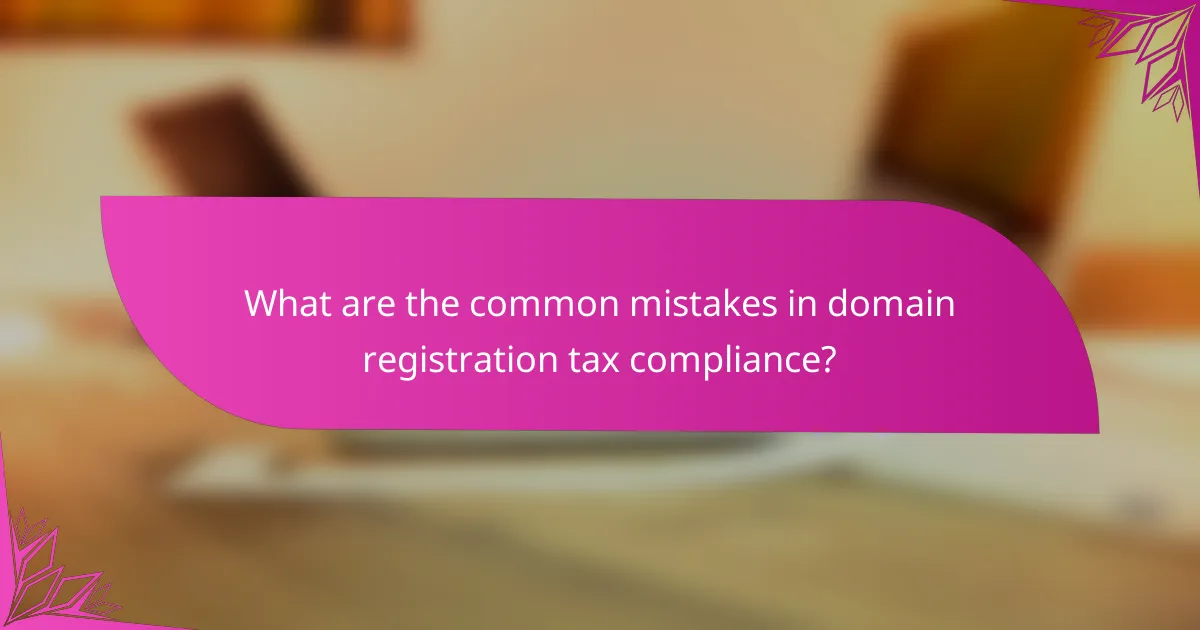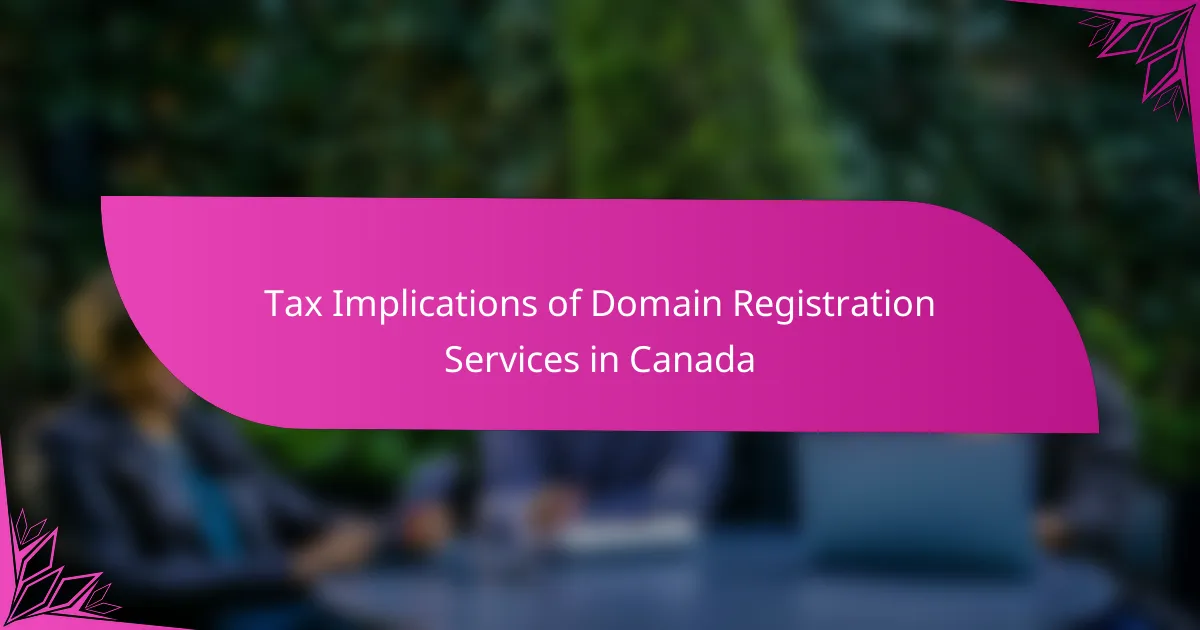Understanding the tax implications of domain registration services in Canada is essential for both businesses and individuals. Key considerations include income tax, GST/HST obligations, and the deductibility of related expenses, all of which can significantly impact overall tax liability. Proper record-keeping and consultation with tax professionals can aid in compliance and financial optimization.

What are the tax implications of domain registration in Canada?
The tax implications of domain registration in Canada primarily involve income tax, GST/HST obligations, and the deductibility of related expenses. Businesses and individuals must understand these factors to ensure compliance and optimize their tax positions.
Income tax considerations
When registering a domain in Canada, the costs can be considered business expenses, which may impact your income tax. If the domain is used for generating revenue, the expenses related to its registration can be deducted from your taxable income. This deduction can reduce the overall tax burden for businesses.
For individuals, if the domain is used for personal projects without a profit motive, the expenses may not be deductible. It’s essential to assess the purpose of the domain registration to determine its tax treatment.
GST/HST obligations
In Canada, domain registration services are subject to Goods and Services Tax (GST) or Harmonized Sales Tax (HST), depending on the province. Businesses must charge GST/HST on the sale of domain registrations and remit this tax to the Canada Revenue Agency (CRA).
If you are a business registered for GST/HST, you can claim input tax credits for the GST/HST paid on domain registration services. This can help offset the tax you collect from customers, improving cash flow.
Deductibility of expenses
Expenses related to domain registration, such as renewal fees and hosting costs, are generally deductible if the domain is used for business purposes. To qualify, the expenses must be reasonable and directly related to earning income.
Keep detailed records of all expenses associated with domain registration to support your claims during tax filing. This includes invoices and receipts, which are crucial for substantiating your deductions if audited.
Tax reporting requirements
Tax reporting for domain registration expenses involves including them in your business income statement. Ensure that you report any income generated from the domain and deduct the associated costs accurately.
For GST/HST, businesses must file regular returns, detailing the tax collected and the input tax credits claimed. It’s advisable to consult with a tax professional to ensure compliance with all reporting requirements and to maximize your tax benefits.

How does domain registration affect business taxes in Canada?
Domain registration can have significant implications for business taxes in Canada, as it is considered a business expense. Companies can typically deduct the costs associated with registering and maintaining a domain name from their taxable income, which can reduce their overall tax liability.
Impact on corporate taxes
The costs incurred for domain registration are classified as business expenses, which means they can be deducted from corporate income when calculating taxes. This deduction helps lower the taxable income, potentially resulting in a lower corporate tax rate applied to the business’s profits. It’s essential for businesses to keep accurate records of these expenses to ensure they can substantiate their claims during tax filings.
For example, if a company spends CAD 200 on domain registration, this amount can be deducted from its revenue, effectively reducing the taxable income by that same amount. This practice can be particularly beneficial for small to medium-sized enterprises looking to optimize their tax obligations.
Tax benefits for startups
Startups in Canada can leverage domain registration expenses as part of their overall tax strategy. Since many startups operate on tight budgets, the ability to deduct these costs can provide crucial financial relief. By reducing taxable income, startups can retain more cash flow for reinvestment in their business operations.
Additionally, some provinces may offer specific incentives or grants for new businesses, which can further enhance the financial advantages of registering a domain. Startups should consult with a tax professional to explore all available benefits and ensure compliance with local regulations.
Sales tax on domain purchases
When registering a domain in Canada, businesses may be subject to sales tax, depending on the province. Most provinces apply the Goods and Services Tax (GST) or the Harmonized Sales Tax (HST) to domain registration fees. It’s crucial for businesses to factor in these additional costs when budgeting for domain expenses.
For instance, if a domain registration costs CAD 100 and the applicable sales tax is 13%, the total expense would amount to CAD 113. Businesses should ensure they are aware of the specific tax rates in their province to accurately calculate the total cost of domain registration.

What are the best practices for managing domain registration taxes?
To effectively manage domain registration taxes in Canada, it is crucial to maintain accurate records, consult with tax professionals, and utilize accounting software. These practices help ensure compliance with tax regulations and can optimize your financial management.
Record-keeping strategies
Maintaining detailed records of domain registration expenses is essential for tax purposes. Keep invoices, receipts, and any correspondence related to your domain purchases organized and accessible. This will facilitate accurate reporting during tax season.
Consider categorizing your expenses by year and type, such as registration fees, renewal costs, and any additional services. This organization simplifies tracking and can help identify potential deductions.
Consulting with tax professionals
Engaging a tax professional can provide valuable insights into the tax implications of your domain registrations. They can help you understand applicable tax laws and ensure you are taking advantage of any available deductions or credits.
Tax regulations can change, so regular consultations can help you stay informed about new developments that may affect your domain registration taxes. This proactive approach can prevent costly mistakes and ensure compliance.
Using accounting software
Utilizing accounting software can streamline the management of domain registration taxes. Many programs offer features specifically designed for tracking expenses, generating reports, and preparing for tax filings.
Look for software that integrates with your bank accounts and allows you to categorize expenses easily. This integration can save time and reduce the risk of errors when reporting your domain-related costs.

What are the common mistakes in domain registration tax compliance?
Common mistakes in domain registration tax compliance can lead to significant financial repercussions for businesses in Canada. These errors often stem from a lack of understanding of tax obligations related to domain registration services.
Ignoring tax implications
Many businesses overlook the tax implications associated with domain registration. This can include sales tax on registration fees and ongoing maintenance costs. Failing to account for these taxes can result in unexpected liabilities during audits.
To avoid this pitfall, ensure you understand the applicable tax rates in your province or territory. For instance, provinces like British Columbia and Ontario have specific sales tax regulations that may apply to digital services.
Misclassifying domain expenses
Misclassifying domain registration expenses can lead to incorrect tax filings. Businesses may mistakenly categorize these costs as personal expenses or fail to recognize them as deductible business expenses. This misclassification can affect overall tax liability.
To ensure proper classification, maintain clear records of all domain-related expenses. Consult with a tax professional to determine which costs are deductible and how to categorize them accurately.
Failing to report income
Businesses that generate income from domain sales or related services often fail to report this income correctly. This oversight can lead to penalties and interest charges from the Canada Revenue Agency (CRA). It’s crucial to keep detailed records of all income sources.
To avoid issues, track all transactions involving domain sales or services. Regularly review your income reports to ensure compliance with tax regulations, and consider consulting a tax advisor for guidance on reporting requirements.

What criteria should businesses consider when choosing a domain registration service?
Businesses should evaluate several key criteria when selecting a domain registration service, including tax compliance features, pricing structures, and customer support options. These factors can significantly impact both operational efficiency and financial obligations.
Tax compliance features
Tax compliance features are essential for businesses to ensure they meet local regulations regarding domain registration. In Canada, businesses must be aware of the Goods and Services Tax (GST) or the Harmonized Sales Tax (HST) applicable to domain purchases. A registration service that clearly outlines tax implications and provides invoices reflecting these taxes can simplify compliance.
Look for services that offer detailed tax reporting capabilities, which can help in maintaining accurate records for tax filings. Some providers may even assist with tax-related queries, making it easier for businesses to navigate their obligations.
Pricing structures
Pricing structures can vary widely among domain registration services, so it’s crucial to compare options. Many services offer competitive rates for initial registration but may have higher renewal fees. Businesses should consider both the upfront costs and long-term expenses when evaluating pricing.
Additionally, some providers offer bundled services, such as web hosting or email accounts, which can provide better overall value. Always read the fine print regarding any additional fees, such as transfer costs or charges for privacy protection.
Customer support options
Reliable customer support is vital for businesses that may encounter issues with their domain registration. Look for services that provide multiple support channels, such as phone, email, and live chat, to ensure assistance is readily available when needed. Response times and support hours can also be critical factors.
Consider checking reviews or testimonials regarding the customer service experience of other users. A provider with a strong reputation for support can save time and reduce frustration during critical moments, such as domain renewals or technical issues.

How do international domain registrations impact Canadian taxes?
International domain registrations can affect Canadian taxes primarily through the treatment of expenses and potential income generated from these domains. Businesses in Canada must consider how these registrations fit into their overall tax obligations, including deductions and reporting requirements.
Tax deductions for domain registration fees
In Canada, domain registration fees can be deducted as a business expense if the domain is used for commercial purposes. This means that businesses can lower their taxable income by the amount spent on registering and maintaining their domains.
To qualify for deductions, keep accurate records of all domain-related expenses, including renewal fees and associated services. Ensure that the domain is actively used for business activities to support your claims during tax assessments.
Income from international domains
Income generated from international domains, such as through sales or advertising, is subject to Canadian taxation. If a Canadian resident earns revenue from these domains, it must be reported as part of their total income for tax purposes.
Consider the implications of foreign tax treaties, as they may affect how income is taxed. Consulting with a tax professional can help clarify obligations and optimize tax strategies related to international domain income.
GST/HST implications
When registering international domains, Canadian businesses may need to consider Goods and Services Tax (GST) or Harmonized Sales Tax (HST) implications. If the domain registration is considered a taxable supply, GST/HST may apply, impacting the overall cost.
Businesses should verify whether the domain registrar charges GST/HST and ensure compliance with tax regulations. Keeping track of these taxes can help in claiming input tax credits, thus reducing overall tax liabilities.
